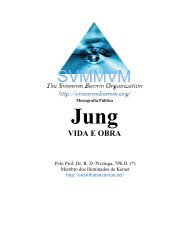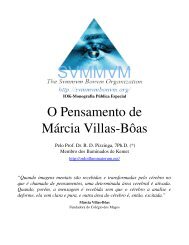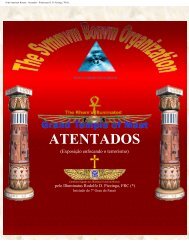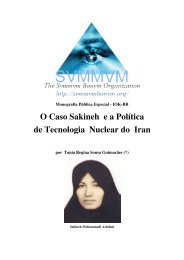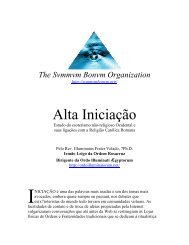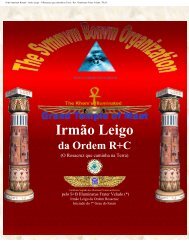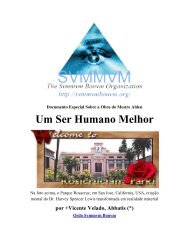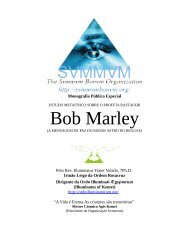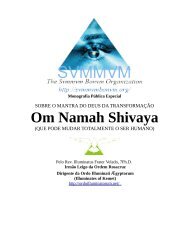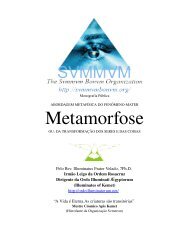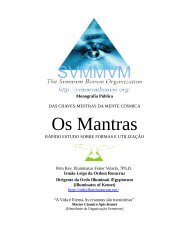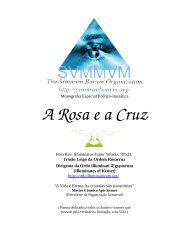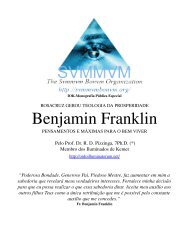History Of The Rose-Croix Sedir - Ordo Svmmvm Bonvm
History Of The Rose-Croix Sedir - Ordo Svmmvm Bonvm
History Of The Rose-Croix Sedir - Ordo Svmmvm Bonvm
Create successful ePaper yourself
Turn your PDF publications into a flip-book with our unique Google optimized e-Paper software.
philosophical Dictionary, tells the following historiettes: " the number of those which<br />
believed in the transmutations is extraordinary; that of the rascals was proportioned with that<br />
of the credulous ones. We saw in Paris the lord Dammi, marquis de Conventiglio, who<br />
drew a few hundreds from louis of several large lords to make them the value of two or<br />
three ecus out of gold. " the best turn than one ever made in alchemy was that of a<br />
Rosicrucian brotherhood which went to find Henri Ier, duke of Bubble, of the house of<br />
Turenne, sovereign prince of Sedan, about year 1620: " You do not have, says him it, a<br />
sovereignty proportioned with your great courage; I want to return to you richer than the<br />
emperor. I then to remain only two days in your States; it is necessary that I will hold in<br />
Venice the large assembly of the Brothers. Maintain only the secrecy. Send to seek litharge<br />
in the first apothecary of your city; there throw a grain alone of the red powder that I give<br />
you; put the whole in a crucible and, in less than one fifteen minutes, you will have gold ". "<br />
the prince made the operation and repeated it three times in the presence of the virtuoso.<br />
This man had made to buy before all the litharge which was in the apothecaries of Sedan<br />
and had then made it resell in charge of a few ounces of gold. <strong>The</strong> follower, while leaving,<br />
made present of all his powder transmuting at the duke of Bubble " the prince did not doubt<br />
that having made three ounces of gold with three grains, it did not make of them three<br />
hundred and thousand ounces with three hundred and thousand grains, and that,<br />
consequently, he was not soon owner in the week of thirty seven thousand five hundred<br />
marcs, without counting what he would do in the continuation. II were necessary three<br />
months at least to make this powder. <strong>The</strong> philosopher was in a hurry to leave; there<br />
remained to him nothing any more, he had very given the prince; it was necessary current<br />
currency for him to hold in Venice the States of hermetic philosophy. It was a man very<br />
moderate in his desires and its expenditure; he asked only twenty thousand ecus for his<br />
voyage. <strong>The</strong> duke of Bubble, ashamed of little, gave him forty thousand of them. When it<br />
had exhausted all the litharge of Sedan, it did not make any more gold; it does not revive<br />
any more its philosopher and was for its forty thousand ecus ". *** Hargrave Jennings tells,<br />
according to the best authorities, the following history. A foreigner arrived to Venice, a<br />
summer of the end of XVIIe century. Its splendid way of life, its elegant manners made it<br />
soon admit in the best company, although nobody knew anything of his antecedents. Its<br />
figure was perfect proportions, the oval face, the broad and prominent face; the black, long<br />
and floating hair; its smile was a enchantor though melancholic person, and sometimes the<br />
major glare of its eyes seemed to reflect the disappeared times. Its conversation was<br />
extremely interesting, though it was discrete and little talker; one knew it under the name of<br />
Gualdi. <strong>The</strong>re remained a few months in Venice; the people called it " Sober Signor "<br />
because of the simplicity in his manners and his costume. It was noticed that it had a small<br />
collection of splendid paintings of which it made the honors with all those which wished it;<br />
that it was versed in all sciences and all arts, speaking about all things as if it had been<br />
present there; finally he did not write nor never accepted any letter and did not have of<br />
account in any banker; he paid always in cash and disappeared from Venice as he had<br />
come there. II bound with a Venetian, widowed lord and father of a remarkably beautiful and<br />
intelligent girl. This gentleman wished to see paintings of Gualdi. This last made the father<br />
and the girl the honors of her collection; they admired in detail all the parts of them, and they<br />
were going to be withdrawn when the gentleman, raising the eyes, saw a portrait of Gualdi<br />
that with certain characteristics it recognized being of Titien. However Titien had died, at that<br />
time, since nearly two hundred years, and the foreigner just seemed to have reached forty.<br />
<strong>The</strong> Venetian one announced its remark with Gualdi, which answered rather coldly that many<br />
things were difficult to include/understand. This incident was told in the city, and, when some<br />
people wanted to see this strange portrait, the signor Gualdi had left Venice by carrying the<br />
key of the gallery of the tables. *** Dr. Robert Plot (51) tells the following history: A<br />
peasant, by trenching in a field, ran up against pickaxe against a small depth a large<br />
rectangular stone which, removed of grasses and foam, let see a large iron ring rivetted in its<br />
center. Believing to discover the hiding-place of a treasure, it raised this stone, after many<br />
efforts, and discovered a broad excavation in which was inserted a stone staircase. It




